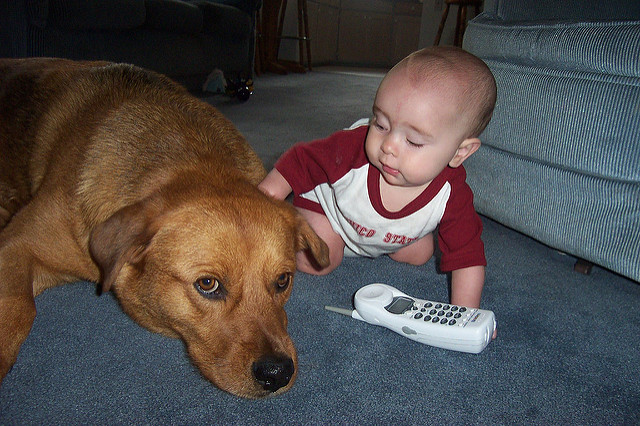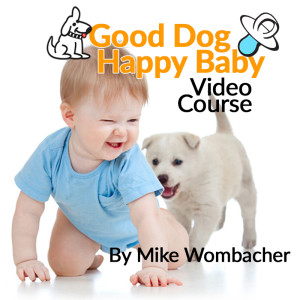
This article by Creed Anthony originally appeared on City Dads Group.
We had two dogs before my daughter was born: a 9-year-old Rottweiler and a 2-year-old Boxer. Bailey and Sydney were spoiled rotten. We took them on walks, played with them relentlessly, and they both slept soundly in our bedroom.
When expecting our first child, we received numerous suggestions – baby gadgets to buy, ways to raise our kids, stores to shop at, etc. One suggestion was on how to prepare dogs for baby entering their lives.
Wait. Prepare the dogs? Are you kidding me?
People warned us the dogs would not be ready for our new normal (we weren’t ready either, but that’s another story) and we should do things to get them ready. We should cry and make random noises in the middle of the night. We should ring the doorbell. We should get kids’ toys that make noise and turn them on around the dogs.
We did some of these things, but not consistently. Needless to say we, including the dogs, weren’t ready when my daughter came home.
The first night we were home, I sat with Bailey as she howled at the steps we wouldn’t let her go up. We thought she was being aggressive, but we weren’t sure. She barked. ALL NIGHT. She seemed put off by the baby.
We finally asked a trusted dog trainer to come and inspect the situation – there was no way I could handle another night like that.
Turns out Bailey was simply being protective of the baby. When we gave her the opportunity, she simply laid down next to the car seat and stood watch of our brand new baby girl.
I wish I learned to prepare dogs for baby
There were a few other hiccups along the way, but — thankfully — none of them were major issues. More importantly, I wish that I had a book like Good Dog, Happy Baby: Preparing Your Dog for the Arrival of Your Child by Michael Wombacher on how to prepare dogs for a baby coming home.
I recently interviewed Wombacher and, while he made many points, the first one was among the most important.
“Do not overestimate the power of jealousy,” he said. Keep in mind all the changes that will happen in your life and realize those changes will your dog as well as well as you. If your dogs associate those changes with your child that’s when the jealousy can come into play.
In some cases, families feel forced to give up their dog because of a new baby.
Wombacher’s training methods and Good Dog, Happy Baby make this difficult choice between dog and child unnecessary. Wombacher also references many benefits (greater self-esteem and empathy to name two) that children gain when they have a dog as a companion.
How to prepare dogs for baby
Good Dog, Happy Baby breaks down into essentially three sections: a questionnaire that helps lay down the groundwork for the program, behavioral issues to address (things like barking, door crashing, jumping, etc.), and exercises to help ease into the transition of bringing the new baby home.
The program consists of 12 steps meant to facilitate the learning process and initiate this new phase of the family’s life.
Wombacher’s words and approach have an inherent flexibility. He’s not an “all or nothing” trainer, an attitude he cautioned against. “People who say ‘only’ and ‘never’ are more interested in their own training philosophy than they are in helping you,” he said.
I encourage any expecting couple with a family dog interested in getting help introducing a baby, or young child, into your pack, to not only check out Good Dog, Happy Baby but also Wombacher’s website.


